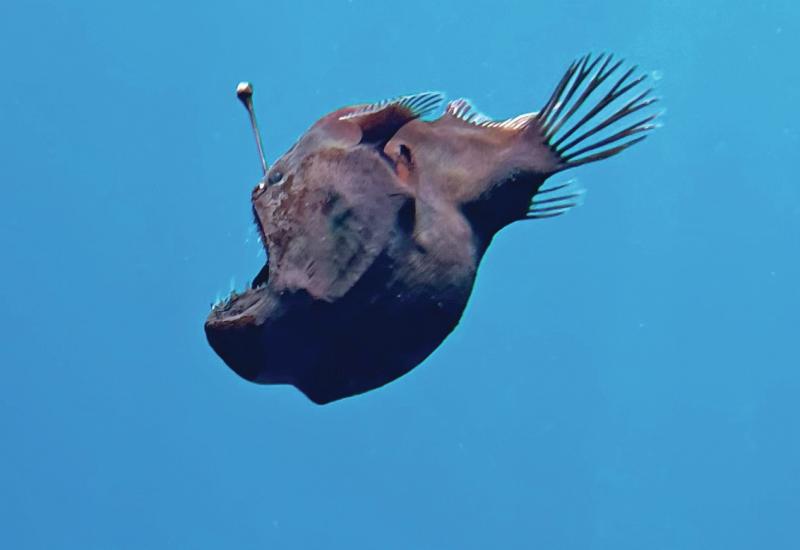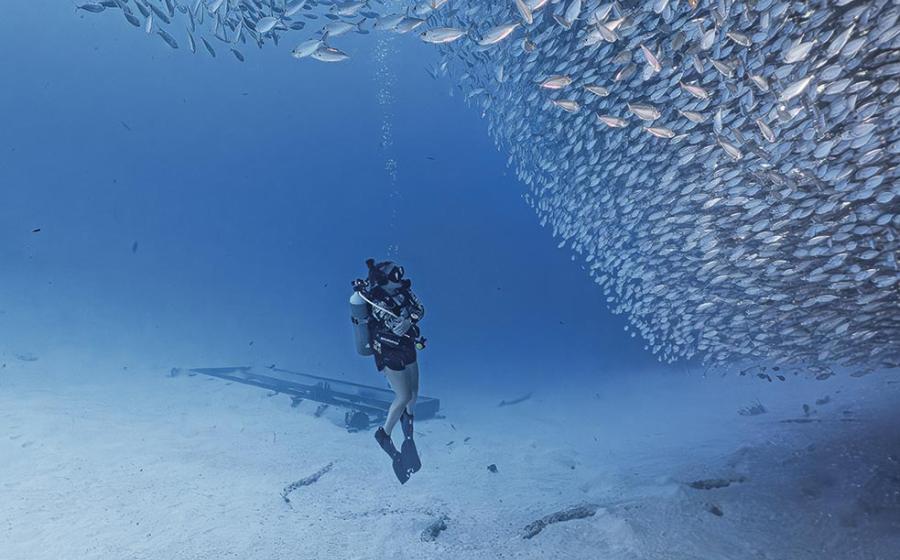Wounded Warriors
We all know the feeling of freedom that diving gives us as we cruise along pristine reefs, weightless in the vast blue world. But that takes on a whole new meaning for the participants of the Soldiers Undertaking Disabled Scuba program. SUDS is a chapter of the Wounded Warrior/ Disabled Sports Project, which helps empower soldiers who have returned from the wars in Iraq and Afghanistan with life-changing injuries. It was started by dive industry expert John Thompson, who relocated from the Caribbean to Walter Reed Army Medical Center when his wife, who is active duty in the army, got a residency at the hospital. Walter Reed is one of the first stops for severely injured soldiers as they transition back into civilian life, and Thompson was moved by what he saw when he arrived. “As soon as you walk into that hospital, the reality of these men’s and women’s situations just hits you in the face,” he says. “ It really made me want to get involved.” So he put his dive-training skills to use, spending his time in the aquatic therapy pool as a Red Cross volunteer. And then he thought, “Why not use diving as a tool to facilitate their rehabilitation?” So he asked for permission to use Walter Reed’s pool as a training facility and started SUDS. The classroom portion of the soldier’s training is done online, and the confined-water portion is done in the hospital’s pool, allowing participants to get comfortable before moving on to their open-water dives. And that’s when the fun starts. Thompson’s program, which is funded solely by donations, takes these newly certified divers on trips to the Florida Keys, Puerto Rico and most recently, Guantanamo Bay, Cuba, to complete their open-water dives. And most participants don’t stop there. They go on to earn Advanced Open Water or Nitrox certifications and continue to participate in the sport as often as they can. SUDS helps make that happen. They run one trip per month to either certify new divers or to help people advance their education. They go mostly to tropical military installations because it’s more cost effective, and they know they will have extra support. The program has low overhead, so nearly all of the money from donations goes directly toward getting the soldiers certified, which they don’t pay a single penny for — not even on the trips. “The biggest thing I hear from the vets is that they have a freedom underwater that they just don’t have on land,” Thompson says. “A lot of the pain and pressure from the prosthetics just goes away.” At first the SUDS program was small. Thompson walked around handing out cards to people he saw at the hospital who he thought might be interested in learning how to dive. But now, word of mouth has taken things to a new level. They have expanded to the National Naval Medical Center and to date have certified more than 140 people. “It really helps their self-esteem,” Thompson says, “because these guys were very active before they got injured, and now some of those activities aren’t available any more. When they discover that they can do something as challenging as scuba, it opens the doors for other things.” SUDS is open to all injured veterans, whether they have been discharged from the hospital or not, as long as they want to continue diving. “I’ll offer this program to them for as long as we exist,” Thompson says. To help sponsor a SUDS diver, visit sudsdiving.org to make a contribution through PayPal. You can also mail a contribution as well as any gear that is still in good working condition to: SUDS Diving Inc., 20011 Park Bluff, San Antonio TX, 78259. — Jackie D’Antonio
We all know the feeling of freedom that diving gives us as we cruise along pristine reefs, weightless in the vast blue world. But that takes on a whole new meaning for the participants of the Soldiers Undertaking Disabled Scuba program. SUDS is a chapter of the Wounded Warrior/ Disabled Sports Project, which helps empower soldiers who have returned from the wars in Iraq and Afghanistan with life-changing injuries. It was started by dive industry expert John Thompson, who relocated from the Caribbean to Walter Reed Army Medical Center when his wife, who is active duty in the army, got a residency at the hospital. Walter Reed is one of the first stops for severely injured soldiers as they transition back into civilian life, and Thompson was moved by what he saw when he arrived. “As soon as you walk into that hospital, the reality of these men’s and women’s situations just hits you in the face,” he says. “ It really made me want to get involved.” So he put his dive-training skills to use, spending his time in the aquatic therapy pool as a Red Cross volunteer. And then he thought, “Why not use diving as a tool to facilitate their rehabilitation?” So he asked for permission to use Walter Reed’s pool as a training facility and started SUDS. The classroom portion of the soldier’s training is done online, and the confined-water portion is done in the hospital’s pool, allowing participants to get comfortable before moving on to their open-water dives. And that’s when the fun starts. Thompson’s program, which is funded solely by donations, takes these newly certified divers on trips to the Florida Keys, Puerto Rico and most recently, Guantanamo Bay, Cuba, to complete their open-water dives. And most participants don’t stop there. They go on to earn Advanced Open Water or Nitrox certifications and continue to participate in the sport as often as they can. SUDS helps make that happen. They run one trip per month to either certify new divers or to help people advance their education. They go mostly to tropical military installations because it’s more cost effective, and they know they will have extra support. The program has low overhead, so nearly all of the money from donations goes directly toward getting the soldiers certified, which they don’t pay a single penny for — not even on the trips. “The biggest thing I hear from the vets is that they have a freedom underwater that they just don’t have on land,” Thompson says. “A lot of the pain and pressure from the prosthetics just goes away.” At first the SUDS program was small. Thompson walked around handing out cards to people he saw at the hospital who he thought might be interested in learning how to dive. But now, word of mouth has taken things to a new level. They have expanded to the National Naval Medical Center and to date have certified more than 140 people. “It really helps their self-esteem,” Thompson says, “because these guys were very active before they got injured, and now some of those activities aren’t available any more. When they discover that they can do something as challenging as scuba, it opens the doors for other things.” SUDS is open to all injured veterans, whether they have been discharged from the hospital or not, as long as they want to continue diving. “I’ll offer this program to them for as long as we exist,” Thompson says. To help sponsor a SUDS diver, visit sudsdiving.org to make a contribution through PayPal. You can also mail a contribution as well as any gear that is still in good working condition to: SUDS Diving Inc., 20011 Park Bluff, San Antonio TX, 78259. — Jackie D’Antonio










